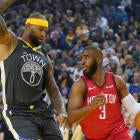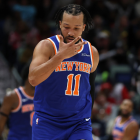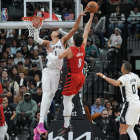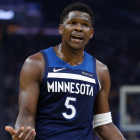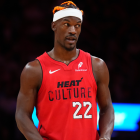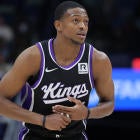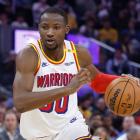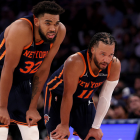OAKLAND, Calif. -- The honeymoon period is officially over.
Warriors coach Steve Kerr and various players admitted that the debut of DeMarcus Cousins on Jan. 18 energized the team, helping them get through the dog days leading up to the All-Star break with a new sense of purpose and direction.
But two games after the break, a tight win over the Sacramento Kings and a lethargic loss to the James Harden-less Houston Rockets, the Warriors and Cousins have been presented with questions and problems that need to be fixed before the team's playoff run.
Lifting the minutes limit on Cousins was supposed to be a celebration for the Warriors -- no longer would their skilled big man have to frustratingly beg Kerr not to take him out, or sit anxiously on the sideline during crunch time as his teammates carried the fate of the game in their hands.
Instead the unlimited Cousins has looked a lot like the limited Cousins -- playing roughly the same amount of minutes and still watching from the sidelines in the final minutes. Kerr warned us as much before the Warriors' win over Sacramento on Thursday -- Cousins' first game without restrictions.
"We've got a lot of guys who are already playing well and playing at a high level. I think the main thing it means, I guess, is if [Cousins is] going well, I don't have to look at [Warriors director of sports medicine and performance] Rick [Celebrini] and say, 'can I leave him out there?' On the other hand, I like playing Kevon [Looney] and I like playing Draymond [Green] at the five sometimes and changing the look. So I don't think it'll look a whole lot different, but whoever's playing well will be out on the floor and whatever group is giving us good minutes will remain out there for longer."
Cousins didn't finish the game against Sacramento, perhaps predictable given the Kings' break-neck pace and Cousins' current conditioning level, but he didn't finish against the Rockets either, even after Green left for the game with an ankle injury. Instead Kerr chose to close the game with little-used second-year center Jordan Bell.
Green said after the Kings game that he knows Cousins wants to be out there in the final minutes, and insists that his time will come.
"At this point now, it's probably starting to piss him off," Green said. "But I know there will be some games that he will close. It's -- it's just kind of the way the cookie crumbles. There's gonna be some games that him and Andre close, and I don't. There's gonna be some games where him and I close and Andre don't. And there's gonna be some games, you know, the way we closed tonight. I think that's coming."
But therein lies the problem.
Why would the Warriors, who have found ultimate success with their devastating closing group that brings opponents to their knees -- the Death Lineup that morphed into the Hamptons Five after the arrival of Durant -- mess with the very thing that makes them so unique?
If the Kings and Rockets games are any indication, it's hard to envision Cousins on the court during the final minutes of playoff games. Both teams continually targeted Cousins in the pick-and-roll, where he struggled to keep up with quick guards on switches. Against the Kings, Cousins allowed baskets to quicker players such as Buddy Hield, Bogdan Bogdanovic and De'Aaron Fox -- either because he couldn't keep up with their foot speed or because he didn't close out quickly enough.
The Warriors are employing a strategy where Cousins drops back into the paint on pick-and-rolls while the guard's original man trails the play, daring opponents into mid-range pull-ups. The problem is that elite guards such as Russell Westbrook, Donovan Mitchell or, as we saw on Saturday, Chris Paul, will either hit those pull-ups or use the space as a runway to get to the rim and draw fouls on Cousins. And if Cousins gets on an island against an elite penetrator ... well ... it probably won't be pretty.
We see you @CP3! 👀 pic.twitter.com/2CUIPmpmhD
— Houston Rockets (@HoustonRockets) February 24, 2019
And that's not to mention what we might have seen had Harden not been sidelined because of a neck injury and flu-like symptoms on Saturday. We've seen Harden eviscerate even the most stout of perimeter defenders, so it's scary to think what he could do against Cousins. In contrast, watch this clip of Looney first stonewalling Damian Lillard's drive attempt then recovering to contest his difficult 3-pointer.
This isn't to suggest that Looney will stop every pick-and-roll or that Cousins will get scored on every time, but even if Cousins gets back into shape, it's hard to see him sticking with the Western Conference's most elite scorers if he ends up one-on-one. In contrast, Kerr said that pick-and-roll defense is one of the reasons Looney has carved out a niche in the NBA.
"He's got great instincts, great length, discipline. He stays down, doesn't get drawn off his feet a whole lot," Kerr said of Looney's pick-and-roll defense. "He played a key role last year for us and has continued to do so this year."
But there's a reason why Looney is a 15-to-20-minute role player and Cousins is a perennial All-NBA contender when healthy. Even without the finishing ability he usually displays and a bout of struggles from the 3-point arc, Cousins has averaged 14.1 points and 7.6 rebounds in just under 24 minutes per game. There have been stretches where he's been simply unstoppable on the block, and he provides a 3-point threat from the center position that the Warriors have lacked for nearly the entirety of their dynastic run (shout out to Mo Speights).
The question is whether the offensive prowess can make up for the defensive struggles, and so far it's been questionable at best. Cousins was a minus-17 in the loss to the Rockets and is a minus-41 over his last five games. It's a loaded stat given that Cousins gets a lot of minutes with the second unit -- but it backs up the eye test that Golden State hasn't quite figured out how to click with Cousins just yet.
The big man is well aware of the fact that teams will continue to target him, more frequently as the team moves into the postseason, but he thinks his ability to defend the pick-and-roll will keep progressing along with the rest of his game.
"Guys are attacking me in the pick-and-roll, it's obvious," Cousins said. "I've just got to be ready for it, be prepared for it and try to stay out of f---ing foul trouble. Jesus Christ. ... Obviously I'm in like a gray area when it comes to that -- you know, trying to get back to myself and also just knowing guys are coming at me. Nobody in this league is gonna feel sorry for me, and I know that. So I'm gonna go out and battle as much as I can and do what I can, but it still is a process for me. ... It's frustrating as hell."
Cousins has always been elite at taking charges and his quick hands get a lot of deflections, steals and blocks in the paint, so it's not like he's been bad defensively. The biggest concern is that, as we see every year, when the playoffs roll around teams go at your biggest weakness ad nauseam until you make a change. If the answer to teams targeting Cousins in the pick-and-roll is to play him less, you have to wonder how he will handle it as the team goes deeper into the playoffs.
"Sure, he's frustrated," Kerr said. "I mean, think about what DeMarcus has been through with the year-long injury, the frustrating free agency. So it's not an easy thing -- a very difficult injury to come back from. And after the first couple weeks, the excitement, the adrenaline, the wear and tear begins, and that's when you've really got to be able to rely on execution. So we'll work with him, and he can do better -- he knows that. He's definitely frustrated, but he cares. He's an emotional guy and wants nothing more than to win and compete, so we've got to help him along, and he's got to help himself along as well."









